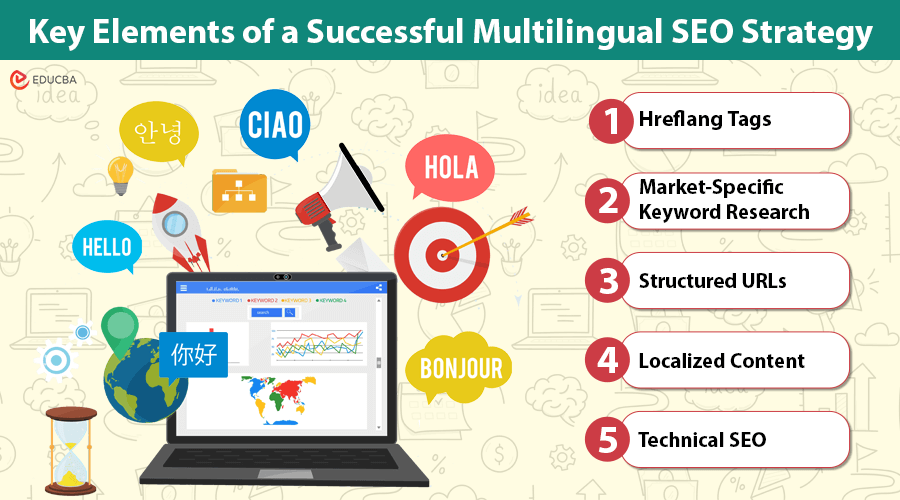
Expand Business Reach in the Global Digital Landscape
The digital world is continuously developing, and businesses are now focusing on international markets to increase their online presence. A multilingual SEO strategy is essential for brands that want to connect with diverse audiences. However, simply translating content is not enough—search engines prioritize relevance, making it necessary to optimize content for different languages, cultural nuances, and search habits.
Benefits of Multilingual SEO
Implementing a strong multilingual SEO strategy offers several advantages, helping businesses expand their reach, improve user engagement, and drive higher conversions. Here are some key benefits:
- Enhances Visibility in Local Markets: Each region has distinct search behaviors, and search engines like Google, Baidu, or Yandex apply different ranking factors. Simply translating keywords may not be effective because direct translations may not match what local users are searching for. A dedicated SEO strategy includes proper keyword research, ensuring that terms align with the language and cultural context of the target audience.
- Improves User Experience and Engagement: A seamless browsing experience encourages visitors to stay on a website longer, reducing bounce rates and increasing engagement. This involves translating text and adapting metadata, alt texts, and URLs. Additionally, localizing visual elements, payment methods, and customer service options enhances credibility and trust among users.
- Increases Organic Traffic and Conversions: Optimized multilingual content generates organic traffic by ranking higher in search engine results. A properly structured site with localized keywords, optimized headings, and region-specific backlinks attracts qualified visitors who are more likely to convert into customers. Overlooking these factors may lead to missed opportunities and reduced visibility in global markets.
Key Elements of a Successful Multilingual SEO Strategy
To build a strong multilingual digital presence, businesses must consider several factors beyond translation, which are as follows:
- Hreflang Tags: Hreflang tags guide search engines in identifying the appropriate page version for a specific language or region. Without these tags, search engines may show the wrong language version to users, causing confusion and higher bounce rates. Properly implementing hreflang tags guarantees that users receive content that best matches their language and regional preferences.
- Market-Specific Keyword Research: Keyword intent varies by region. Translating English keywords directly into another language may not yield effective results. Instead, localized keyword research is essential to identify the phrases users search for in their native language. This is a critical part of multilingual SEO.
- Structured URLs: Proper URL structure is vital for SEO. Businesses can opt for country-code top-level domains (ccTLDs), subdirectories, or subdomains. Choosing the right URL structure improves indexing and ensures that search engines attribute content to the correct region.
- Localized Content: Cultural context matters just as much as language. While translation simply converts text, localization adapts content to suit the target audience’s cultural norms, preferences, and humor. This includes adjusting images, references, and website design to make the content more relatable and engaging.
- Technical SEO: Technical aspects like mobile friendliness, page load speed, and structured data impact SEO performance. Understanding how users from different regions interact with content helps optimize these technical elements. Fast load times, proper indexation, and responsive design improve search rankings and user satisfaction.
Common Challenges in Multilingual SEO
Implementing a multilingual SEO strategy is not without its challenges. Some common obstacles include:
- Avoiding Duplicate Content Issues: Duplicate content across multiple language pages can affect rankings without proper canonical tags or Hreflang implementation. Ensuring unique, optimized content for each audience helps resolve this issue.
- Managing Different Search Engine Algorithms: While Google is the dominant search engine in many regions, search engines like Baidu, Yandex, and Naver use different ranking factors. A successful SEO strategy must account for these algorithmic differences and adjust SEO tactics accordingly.
- Handling Automatic Translations and SEO Risks: Machine translation tools often fail to capture cultural nuances and local keyword intent. Relying on automated translations can lead to awkward phrasing, misinterpretation, or poor keyword targeting. Professional multilingual SEO services ensure content resonates naturally with local users and aligns with search engine algorithms.
- Maintaining Consistency Across Languages: Large-scale multilingual websites must maintain consistent branding, tone, and messaging across all languages. However, local adaptations should not compromise brand identity. A solid multilingual content management strategy ensures that updates reflect across all language versions without losing SEO value.
The Role of Multilingual SEO Consultancy
Multilingual SEO consultancy can provide valuable insights, given the complexity of optimizing content for multiple languages. Experts can guide businesses on market-specific search behaviors, recommend best localization practices, and implement advanced SEO strategies to improve rankings globally. Their expertise helps businesses navigate the technical aspects, avoid common pitfalls, and expand their reach.
Final Thoughts
Investing in a multilingual SEO strategy is essential for any business aiming to succeed in international markets. By focusing on language, culture, and technical SEO elements, brands can boost their visibility, drive organic traffic, and maximize conversions across various regions. A well-executed SEO strategy ensures content is effectively translated and optimized for search engines and user engagement, leading to long-term success in the global digital space.
Recommended Articles
We hope this guide on multilingual SEO helps you reach global audiences and improve search rankings across different languages. Check out these recommended articles for more insights on expanding your online reach effectively.

